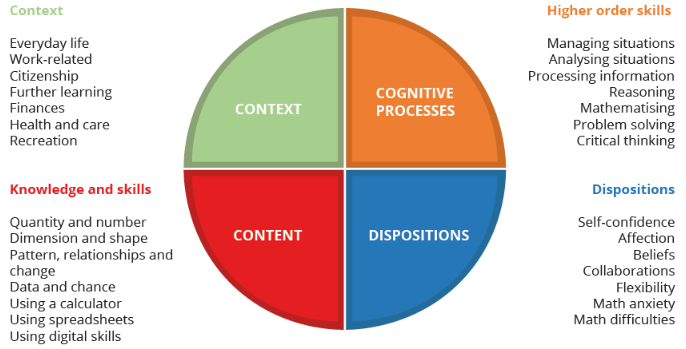A COMMON NUMERACY FRAMEWORK
The numeracy framework looks at four aspects of numeracy skills
context, content, higher-order skills, and dispositions.
Click here for the full report on the framework
What matters to improve numeracy skills?
The cognitive domain “mathematics” has a well-established and an unambiguous content description and an international “language”. However, the concept of numeracy and numerate behaviour encompasses more than just substantive mathematical knowledge and skills. It is about managing all kinds of situations that require mathematical insight, knowledge and skills, as described in the PIAAC definition. Competencies which enable individuals to adequate actions in such situations need further elaboration. Higher order skills, dispositions with regard to mathematics, and the situation in which mathematical activities take place, play an essential role. The use of mathematical knowledge and skills (content) in daily life is always situation-specific (in context). The quality of the mathematical action depends on how the person relates himself to his or her mathematical knowledge and skills (dispositions) and the extent to which he/she can oversee and control a situation (higher-order skills). Each of the four components plays a role in one way or another in every situation. The figure below shows which aspects are mapped out in CENF.

CONTEXT
Numerate behavior is always embedded in a context. Some numeracy take place in everyday life such as in daily activities of the individual such as cooking. Numeracy can also be in the context of work and professional settings, ranging from such as simple lists of numbers to complex algoritm-driven applications. The last category is media and public life such as data visualizations. Each activity in adult education will probably be related to at least one of the context situations. This may depend on how provisions for adults have been organized. Courses related to work, for example, will have a clear focus on the work situation, but may also focus on more general topics for the individual participants. Courses organized for financial literacy will have a clear focus on budgeting. Courses meant for second language learners may also focus on further learning.
HIGHER ORDER SKILLS
Higher order skills matter to improve numerate behavior. The skills mentioned can be found in some frameworks regarding mathematics or numeracy. There is an overlap with so-called 21st century skills. Every individual – whatever his/her cognitive abilities and experiences – uses higher order skills. Everybody makes decisions, reasons, and processes information. Obviously these skills can also be improved by many individuals. These skills include managing and analyzing situations, but also critical thinking and problem solving.
CONTENT
Content knowledge and skills matter to improve numerate behaviour. The first four subcategories – quantity and number; dimension and shape, pattern, relationship and change; data and chance; – can be found in most frameworks regarding mathematics or numeracy outside the formal school system. They can be considered as the contemporary replacements of the Algebra-and-Geometry-division which dominated the 19th and 20th century. The use of (digital) tools and applications is another set of subcategories which nowadays matters to cope with situations in our digitalised society.
DISPOSITION
Adult numeracy dispositions develop over the course of life, starting from childhood and compulsory school. They depend on people’s own capabilities, beliefs and feelings concerning mathematics, but are also influenced by external positive and negative experiences: how and what mathematics was learned in schools & experiences in lived-in situations. Student that performs better on school mathematics, lead to good math and numeracy dispositions: feeling confident with numbers, pleasure with numbers, and recognizing the usefulness of mathematics. Conversely, students with negative experiences may develop negative feelings for numbers, less self-confidence or even math-anxiety. The disappointment when receiving low marks for mathematics may have enormous influence on numeracy capacities of the future adult.